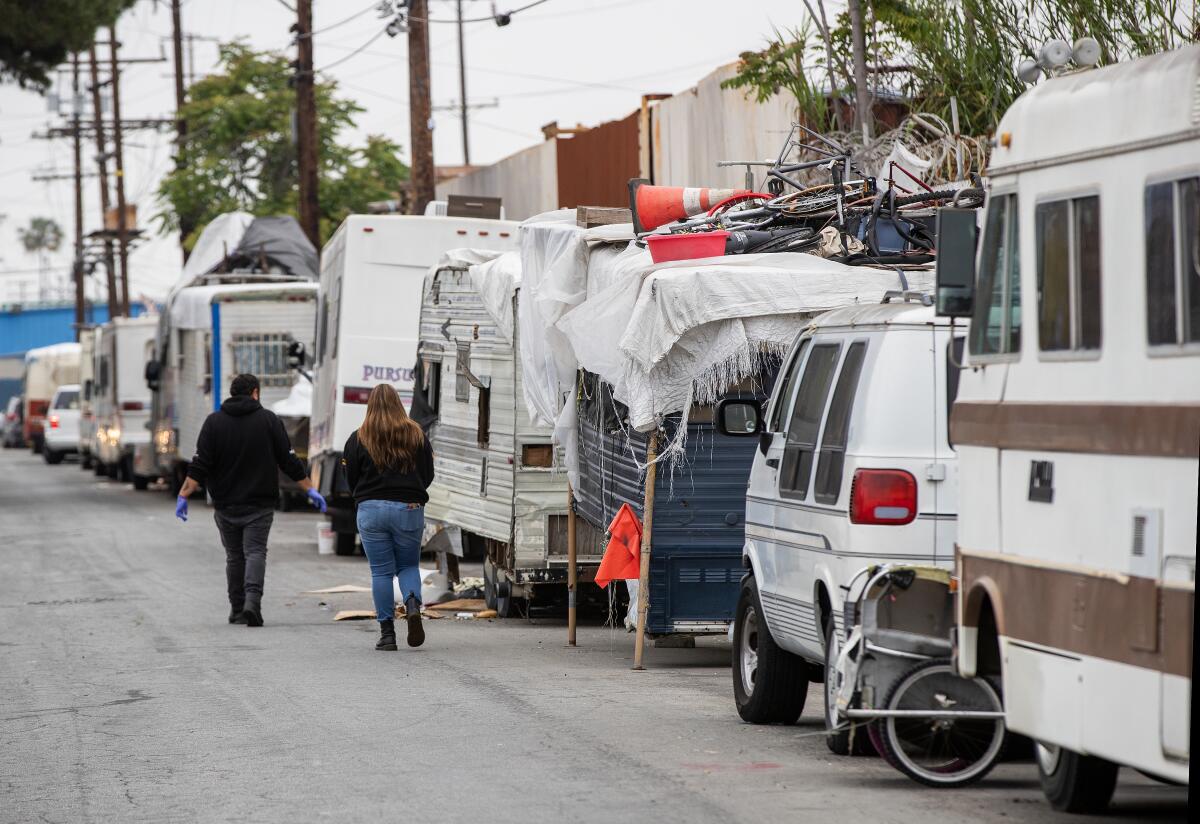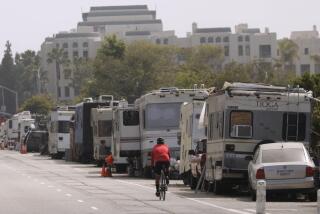âOur city is not an RV parkâ: L.A. to study widespread RV parking ban

An effort to restrict the thousands of RVs parked in residential areas, next to schools and along commercial districts, is gaining steam, as Los Angeles struggles to figure out how to house the families and individuals living in them.
In a 14-0 vote Monday, the Los Angeles City Council ordered city agencies to come up with ârecommendations for a citywide programâ that would limit RV parking, while also providing restrooms, septic waste removal, help finding housing and other services in designated areas.
Thousands of Angelenos reside in vehicles, and while Mayor Karen Bass has focused on housing homeless people living in tent encampments, finding places for families and individuals sleeping in four-wheel shelters has proved much harder. Many RVs dwellers have jobs or families and donât want to go to shelters with strict rules, or lose their vehicles.
High rental rates have made RVs a comparatively more dignified alternative for those on the margins. The small bathrooms and living spaces offer privacy, security and a sense of a home. But communities have complained for years about the ubiquity of RVs, with people in some of the worst encampments dumping trash and sewage, starting fires on the street and dealing drugs.
âOur city is not an RV park, and we canât and shouldnât put up with the widespread impacts these RV encampments cause,â said Councilmember Traci Park, who championed the motion. Earlier this year, she helped expand overnight parking restrictions in parts of her district, which includes Venice, Mar Vista, Westchester, Brentwood and Pacific Palisades.
Individual council districts have attempted to deal with the proliferation of RVs with a hodgepodge of services from emptying out dirty septic tanks weekly to offering housing programs. But pressure is building for a citywide approach as more districts impose parking restrictions, forcing homeless people to play a nightly game of musical chairs to find a place to sleep.
In a landmark ruling this June, the Supreme Court cleared the way for cities to remove homeless encampments from parks, sidewalks and other areas even when they lack sufficient shelter beds.
Gov. Gavin Newsom then ordered state agencies to remove encampments and encouraged cities to follow. He threatened last week to take away state funding from counties that donât show improvement on homelessness.
Los Angeles hasnât âadjusted a single policy,â since the ruling, Park said, in advocating for her motion before the council.
Councilmember Eunisses Hernandez, who represents the Eastside, where working class communities are facing the constant pressure of gentrification, responded with worries of what the restrictions will mean for families and the city.
âWe donât even have enough staff to enforce it, and I donât believe it will work,â she said, of any subsequent measure that would come from the recommendations and curb vehicle camping in wide swaths of the city. She voted for Parkâs motion, not as an endorsement but as a way to gather data.
She introduced a separate motion, approved in a 14-0 vote, intended to gather more information before creating a citywide policy that would shuffle people around. The legislation asks for a report from the City Administrative Officer and the Los Angeles Homeless Services Authority that would map out where people are living in RVs and identify potential parking lot space for them.
It would also tabulate the cityâs cost for an ordinance that would restrict parking and look deeper into how those rules could adversely hurt vehicle dwellers moved away from the services and networks they rely on and could help them find a permanent home.
âI hope that we can remain conscious that RVs are not just vehicles and not just where, you know, thereâs criminal activity sometimes, but theyâre homes for many people who have been marginalized,â Hernandez said. âThese people are families, veterans and working class individuals who have been forced to find refuge wherever they can. They are real people who face uncertainty.â
More to Read
Sign up for Essential California
The most important California stories and recommendations in your inbox every morning.
You may occasionally receive promotional content from the Los Angeles Times.











